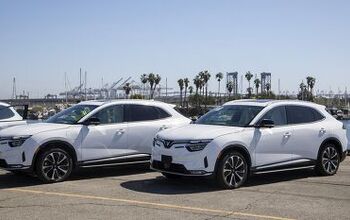NAFTA Talks Finally Progressing Slightly Better Than a Dumpster Fire

After what could be called some of the least productive negotiations in North American history, some progress is finally being made on the North American Free Trade Agreement. We know, with all of the negative rhetoric being slung from all sides, it sounds impossible. However, all three trading partners are beginning to bend on some of the issues that have proven the trickiest to navigate.
Among them is the faintest glimmer of hope that the automotive content requirements pushed by the United States might be adopted by the other nations, albeit in a modified form.
Still, progress is progress, and it only took about six months to get to a point where some meaningful headway could finally be made. Absolutely incredible. Let’s give these officials a huge round of applause for really getting in there, taking care of business, and not wasting a bunch of time.
Dave Reichert, the Republican chairman of the House Subcommittee on Trade, told Bloomberg that U.S. Trade Representative Robert Lighthizer recognizes there is plenty left to do, but seems hopeful. “There’s just an air of optimism. They’re already talking about additional rounds,” he said.
There will be additional rounds, too. When Donald Trump made his initial threats to abandon NAFTA, he gave North America until December to figure out how to save it. That deadline has since extended to March of 2018 and may now progress well past June.
“I’m more optimistic than I was six months ago,” said Bill Pascrell, a Democratic member of the House Ways and Means Committee and one of the lawmakers who flew into Montreal for meetings on the sidelines of primary negotiations. He claims the tone surrounding NAFTA has changed. Instead of a do-or-die scenario, he now claims it’s akin to, “Let’s make this marriage work.”
However, the marriage has been troubled and a major point of contention has been the adjusted regional content requirements for cars proposed by the United States. Both Mexico and Canada have described the U.S. content proposals as “unworkable” in the past. During the last round of talks, Canada suggested “rewriting” how the value of a car is calculated to demonstrate a higher share of local content. While not particularly promising, it’s the first time any country has approached the issue without a take-it-or-leave-it attitude.
“I think it would be premature to say anybody is buying into anything at this point,” said Perrin Beatty, head of the Canadian Chamber of Commerce. “[Lighthizer and the U.S.] really set the tone and they convey a sense as to whether or not the chemistry is good, and whether or not there are good prospects for reaching an agreement.”
Chief negotiators from the U.S. reaffirmed their commitment to moving forward in all areas of the NAFTA debate in order to conclude negotiations as soon as possible. But most of the headway made thus far has been on the issues that have proven mutually beneficial for all countries. Nobody seems to want to give up any ground, so this newfound optimism could evaporate quickly.
The next round of talks are scheduled for February in Mexico City.
[Image: NAFTA Secretariat]

A staunch consumer advocate tracking industry trends and regulation. Before joining TTAC, Matt spent a decade working for marketing and research firms based in NYC. Clients included several of the world’s largest automakers, global tire brands, and aftermarket part suppliers. Dissatisfied with the corporate world and resentful of having to wear suits everyday, he pivoted to writing about cars. Since then, that man has become an ardent supporter of the right-to-repair movement, been interviewed on the auto industry by national radio broadcasts, driven more rental cars than anyone ever should, participated in amateur rallying events, and received the requisite minimum training as sanctioned by the SCCA. Handy with a wrench, Matt grew up surrounded by Detroit auto workers and managed to get a pizza delivery job before he was legally eligible. He later found himself driving box trucks through Manhattan, guaranteeing future sympathy for actual truckers. He continues to conduct research pertaining to the automotive sector as an independent contractor and has since moved back to his native Michigan, closer to where the cars are born. A contrarian, Matt claims to prefer understeer — stating that front and all-wheel drive vehicles cater best to his driving style.
More by Matt Posky
Latest Car Reviews
Read moreLatest Product Reviews
Read moreRecent Comments
- MaintenanceCosts "And with ANY car, always budget for maintenance."The question is whether you have to budget a thousand bucks (or euro) a year, or a quarter of your income.
- FreedMike The NASCAR race was a dandy. That finish…
- EBFlex It’s ironic that the typical low IQ big government simps are all over this yet we’re completely silent when oil companies took massive losses during Covid. Funny how that’s fine but profits aren’t. These people have no idea how business works.
- Ajla Goldman Sachs 🥂
- Rna65689660 DVR and watch all that are aired. Has been this way for 40 years.


































Comments
Join the conversation
I really think the "old school Euro type" American protectionist socialists need to think twice about what you wish for. If you have not noticed the rest of the world have accelerated bilateral and multilateral trade deals without the US. What will occur is when these trade deals are completed the US is further shut out of these markets. I read the Chinese are considering import tariffs on beef or increasing the health regulations for the import of US beef. TRi There is also talk of the Chinese government telling the populace not the buy US vehicles. Most every modern country is in the same position as the US regarding manufacturing. The US can't say we want X number of manufacturing jobs when they don't exist as most every country have lost them as well. And to the Trump Luddites the majority of those manufacturing jobs have gone the way of robotics. Trump is slowly screwing America, like his businesses. What occurred? He used the legal system when he went bankrupt. The US is NOT a business, treating it like one, especially using poor business practices like is current will only reduce the US economy. Wake up!!! What is the US unemployment rate?
I concerned that in our (Canada's) efforts to save sacred cows like dairy supply management (which costs virtually all Canadians, to the benefit of a few thousand), they'll have to give in on other issues that also cost us, essentially making it a lose-lose for us. IMO one of the best things that could come from these negotiations would be Canada getting 'forced' to turf supply management.